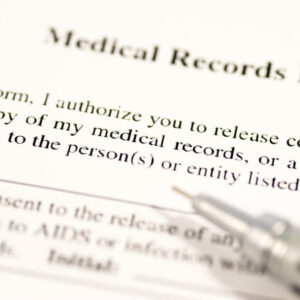 After you were injured in an accident caused by someone else’s wrongdoing, you’ll want to ensure you have the relevant medical records. These documents are among the most consequential pieces of evidence in a personal injury case and can help you prove the nature and extent of your injuries and losses.
After you were injured in an accident caused by someone else’s wrongdoing, you’ll want to ensure you have the relevant medical records. These documents are among the most consequential pieces of evidence in a personal injury case and can help you prove the nature and extent of your injuries and losses.
In this post, the Dallas personal injury attorneys of Benton Accident & Injury Lawyers will share five essential tips for obtaining your medical records.
Tip 1: Know Your HIPAA Rights
The Health Insurance Portability and Accountability Act of 1996, or HIPAA, is the federal law governing medical recordkeeping practices. Under this law, you have the right to access your medical records, for any reason, in the format most convenient for you. After you request records from your doctor, they have thirty days to deliver them to you. If thirty days is not reasonable, the provider must explain why and give you a date you will have your records. This date can be up to thirty days more.
If a healthcare provider refuses to give you your records or offers an excuse not to give them to you, remind them of your HIPAA rights. Your legal team can help write official letters asking for your records in cases where a provider is particularly obstinate.
Tip 2: Know Which Fees are Reasonable
HIPAA does not bar providers from charging fees for you to access your medical records. However, these fees must not be excessive or burdensome on you. Reasonable charges could include:
- Paper and printing costs
- Cost of a physical drive or optical disk to store digital files
- Postage
- Labor of accessing the records, if they are in paper files or on a legacy computer system
Your attorney can assist you in challenging an unreasonable fee under HIPAA.
Tip 3: Go Online
 Hospitals, clinics, and other healthcare providers increasingly use online patient portals to keep electronic medical records and allow patients to access them from their devices. Depending on the provider and their practices, you may need to opt-in to use these portals. In most cases, you can opt in at a medical appointment or by speaking with a receptionist over the phone.
Hospitals, clinics, and other healthcare providers increasingly use online patient portals to keep electronic medical records and allow patients to access them from their devices. Depending on the provider and their practices, you may need to opt-in to use these portals. In most cases, you can opt in at a medical appointment or by speaking with a receptionist over the phone.
Not every piece of information will be found through a patient portal, but you will generally be able to find and print information about:
- Your most recent visits, including full chart summaries
- Direct communications between you and your provider
- Blood test results, possibly with lay interpretations of each value
- Medications the doctor prescribed you
- Vaccines you received
Tip 4: Sign Release Forms Early and Prudently
HIPAA requires you to sign a release form for your request to protect unauthorized people from accessing your medical records. This form asks for information to verify your identity, such as your date of birth and the dates you saw your providers. You may need to show identification if you submit the release form in person.
A release form will also ask you:
- The date by which you need your records – For best results, set this date to 30 days after you submit the form in accordance with your legal rights. You may receive your documents before the date.
- The period you allow the records to be shared – Consider setting the end date as 30 days from when you submit the form. To keep your records private, you should only allow them to be open for as much time as is necessary within your rights.
Finding and delivering medical records takes time. The sooner you sign and submit a release, the sooner a provider can find the information you need and the sooner you’ll have access to it.
Tip 5: Ensure Your Records are Accurate
Inaccurate medical records can affect both your personal injury case and the quality of your care. Hospitals and clinics have different procedures to correct their records, but they usually involve a correction request form. You may request a copy of the form from the recordkeeping department and return it to them. Within two months, your doctor will approve or deny the correction and explain why they made their choice.
Contact a Texas Medical Records Attorney
If you’re having difficulties obtaining medical records for a personal injury case, the Dallas personal injury attorneys of Benton Accident & Injury Lawyers are ready to defend your rights. We have helped hundreds of clients successfully win compensation for their accident injuries.
Call our office at (214) 777-7777 if you have questions or want to schedule a free case review today.
Related reading: The Importance of Tracking Your Medical Bills After Your Accident
Related reading: Why Your Medical History Before the Accident Is So Important
Related reading: Why You Need to Journal About Your Pain and Suffering

